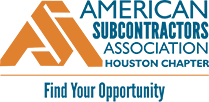On September 18, 2019, ASA joined the Construction Industry Safety Coalition (CISC)’s request for a 60 day extension of the public comment period for the Occupational Safety and Health Administration’s (OSHA) Request for Information (RFI) on “Occupational Exposure to Respirable Crystalline Silica-Specified Exposure Control Methods” 84 Fed. Reg. 41667 (August 15, 2019). The ASA, along with the CISC, strongly supports OSHA’s initiative to expand Table 1 to include additional jobs/tasks and control measures. However, ASA and the CISC believes that providing only 60 days to submit comments to the RFI does not provide interested stakeholders adequate time to gather, analyze, and provide the types of information OSHA is seeking. Extending the comment period by 60 days will help ensure that OSHA has the best data available to it to assess whether and how to improve Table 1.
The CISC, an alliance of over twenty trade associations across the construction industry including the ASA, was formed several years ago to provide comments on OSHA regulatory initiatives from the wide-range of construction trades affected by OSHA standards. The CISC speaks for small, medium, and large contractors; general contractors; subcontractors; union contractors; etc. The CISC has submitted comments on a variety of OSHA rulemaking initiatives and has been particularly active throughout OSHA’s silica rulemaking process. The CISC submitted extensive comments in response to OSHA’s first proposal to issue a comprehensive respirable crystalline silica standard and worked closely with the Agency and organized labor in developing Frequently Asked Questions (FAQs) to assist with construction compliance after the rule was finalized.
As OSHA recognizes, in just the last few years there has been significant advancements made in technology with respect to tools and control measures that could be added to Table 1. There is data available from trade associations, contractors implementing control measures, and product manufacturers, as well as academic studies on new control measures or the use of control measures in different environments. The CISC intends to collect as much of this information as possible, analyze it, and submit it for the Agency’s consideration, along with other information from contractors regarding the difficulties of compliance with the rule. Given the volume and wide range of data available, however, providing only 60 days to submit this critical information to the Agency is insufficient.
ASA and CISC contend that by allowing an additional 60 days for comment will result in OSHA receiving a more robust set of data, which would help shape a future regulatory approach. Furthermore, such an extension should not significantly delay the OSHA’s schedule. It’s our contention that a short extension will only result in better information submitted to OSHA without negatively impacting OSHA’s regulatory agenda.

